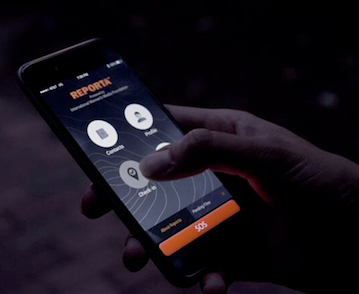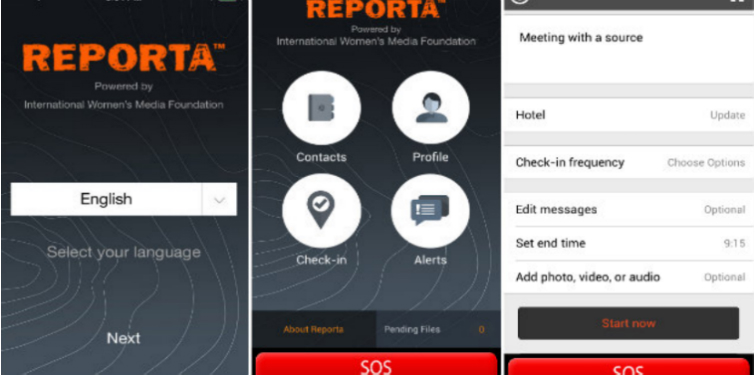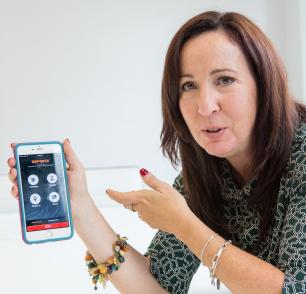
WASHINGTON (International Women’s Media Foundation / International Journalists’ Network / Pacific Media Watch): The International Women’s Media Foundation (IWMF) has launched a free mobile security application, Reporta, to empower journalists worldwide working in potentially dangerous conditions to quickly implement their security protocols with the touch of a button.
Reporta is a comprehensive personal safety application for iPhone and Android devices that journalists working in potentially dangerous environments can use to quickly execute their security protocols. The application is available in six languages – Arabic, English, French, Hebrew, Spanish, and Turkish.
Executive director of IWMF Elisa Lees Muñoz said “journalists covering conflict zones, working in repressive environments, or reporting on sensitive or highly charged issues are too often the targets of attacks”.
“Reporta was developed with the goal to harness the power of the one piece of technology that most journalists use every day, a mobile phone. Now more than ever, it is critical to equip journalists with a free tool to help them stay safe and best positioned to continue to tell the significant stories of our time.”
The launch of the new app was announced in late September.
App features
Reporta allows journalists to be proactive with their security protocols, making it easy to issue notifications containing photos, audio, or video to designated, pre-loaded contacts using its three essential features;
1. An automated and customizable check-in system that allows journalists to provide key information about their location and status.
2. A customizable alert function that allows journalists to let key contacts know when their safety or that of a colleague’s may be at risk.
3. A SOS feature that can be used to send an emergency message with the touch of a button.
Reporta’s launch comes at a time when violence against journalists is on the rise. The last three years have been widely reported as the deadliest period on record.
Too often, journalists reporting on corruption, conflicts, and other illegal or sensitive activities face threats of harassment, abduction, or even imprisonment.
In addition, IWMF research found that nearly two-thirds of women in media had experienced intimidation, threats, or abuse as a direct result of their work.
Criticisms
However, almost as soon as it was released, security experts raised concerns.
Some felt the application might be compromised by hackers such as government agents or criminal groups who stalk journalists and their sources. They questioned Reporta’s data retention programme and how it might be used.
In an article from the International Journalists’ Network (ijnet), security researcher Eleanor Saitta noted: “They claim to have audits done, but there are no public audit reports, making it impossible to get any understanding of their code quality or whether they’re actually doing anything they claim to be doing.”
More worrying, she said, is that Reporta is likely to attract highly sophisticated nation-state hackers.
The Reporta FAQ promises data encryption and server security, but the IWMF is a non-technical NGO, so is it capable of defending its servers against very savvy attackers?
Saitta also took issue with Reporta’s privacy policy.
In an email that she wrote to Motherboard she said:
“Basically, they collect a large amount of information and their staff have access to all of it, including the content of messages sent through the system and the location of users.”
According to the privacy policy, the IWMF reserves the right to share this data with a wide variety of third parties, and to respond to subpoenas and court orders from an unspecified number of jurisdictions.
"The latter," Saitta wrote, "is especially problematic, because the entire point of the application is to provide safety for journalists operating in regions where the government may be corrupt and otherwise hostile to freedom of expression."
‘Lack of transparency’
Other security experts agreed with Saitta's analysis.

Runa Sandvik an independent security researcher who, like Saitta, serves on the Technical Advisory Board of the Freedom of the Press Foundation said his main concern is the lack of transparency.
"The app was created not just as a panic app, but one that journalists can also use for regular check-ins with notes and photos and videos. Exactly where that data goes, who has access to it, for how long, and so on is not made clear to users."
IWMF has since addressed that concern on its website stating:
“Since its launch, we have received a lot of constructive feedback on Reporta. Some IT security experts have recommended that we make the app’s code open-source to increase transparency. We agree. We plan to place the code in a public repository. The safety and security of journalists is our highest priority and is at the core of the IWMF mission.”
According to Muñoz, Reporta was created to fill a need in a world that has become increasingly more dangerous for journalists.
“We designed Reporta to comprehensively integrate those protocols, such as Check-In, SOS, Alerts and distinct contact groups for distinct circumstances. Reporta is intended to be used along with other resources journalists can and should use to assess, develop and implement their security protocols,” Muñoz said.
Building on Reporta, the IWMF plans to launch ReportaPro, an enterprise-scaled platform with back-end capabilities specifically designed for media organisations using Reporta. ABC News and Sinclair Broadcast Group are founding partners of ReportaPro.
This work is licensed under a Creative Commons Attribution-NonCommercial 3.0 New Zealand Licence.




